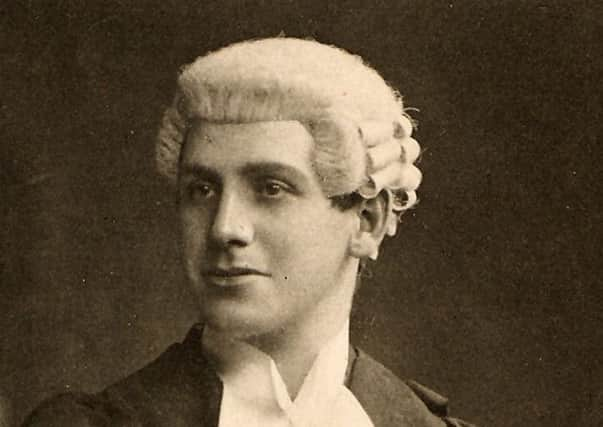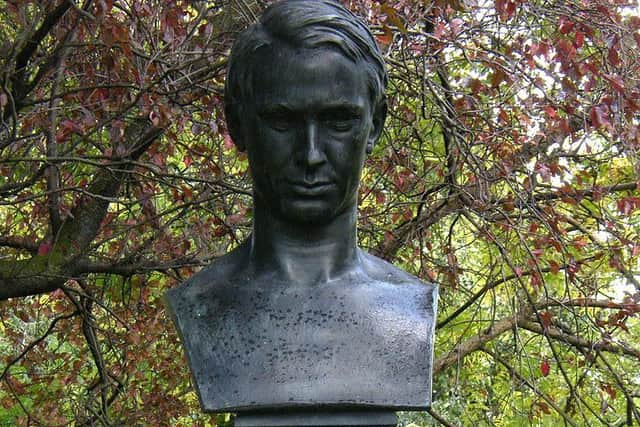Gifted Irish nationlist died 100 years ago on battlefield


Tom Kettle was educated at Clongowes Wood and University College, Dublin, and was one of the most promising students of his generation.
He was widely read in French and German, studied in Germany, and had a European perspective which few of his nationalist contemporaries could match.
Advertisement
Hide AdAdvertisement
Hide AdA Home Ruler, he was active in student politics, auditor of the Literary and Historical Society and editor of the St Stephen’s (a magazine at the university).


Although called to the bar in 1905, he chose to pursue a career in political journalism instead.
In July 1906, he won the East Tyrone seat for the Irish Parliamentary Party (by 18 votes) in a by-election.
Kettle believed in the inevitability of Home Rule and at this stage he did not take unionists or their concerns very seriously, a point demonstrated in the House of Commons on February 4, 1908, when he claimed:
“Ulster unionism is not a party. It is only an appetite.


Advertisement
Hide AdAdvertisement
Hide Ad“Take away from them the people who hope for office, the people who have canvassed for office for other people, and who are pushing the claims for office for their brothers and their brothers-in-law, and sons and nephews, and the Ulster Unionist Party would be represented by about two members.”
In January 1910 he held the seat with an increased majority (140 votes).
On this occasion his unionist opponent was Somerset Saunderson, the son of Colonel E. J. Saunderson, the first chairman of the Irish Unionist Parliamentary Party, a fact which provided Kettle with one of his most amusing lines during the campaign: “Mr Saunderson has declared so often that he is the son of Colonel Saunderson, I am inclined to believe him.”
Inexplicably, Kettle chose not to contest the General Election of December 1910 at exactly the moment when Irish politics were becoming extremely interesting.
Advertisement
Hide AdAdvertisement
Hide AdIt was true that East Tyrone was a very marginal and demanding seat.
In addition, he had been appointed Professor of National Economics and that he had been criticised in some quarters for neglecting his academic duties but the decision still remains curious, not least because his interest in politics and support for Home Rule remained undiminished.
In November 1913, he joined the Irish Volunteers and was one of four Redmondites on the provisional Volunteer Executive of 30.
At the outbreak of the Great War, he was in Belgium to buy guns for the Irish Volunteers.
Advertisement
Hide AdAdvertisement
Hide AdHe was shocked by the ferocity of the German onslaught and experienced the early days of the German occupation.
He was appalled by the wanton destruction of the great university library at Louvain on 25 August, and wrote impassioned reports for the liberal Daily News.
His experience confirmed his belief in the importance of fighting for democracy.
He also believed that the war was being fought on behalf of small nations such as Belgium, Serbia and Ireland.
Advertisement
Hide AdAdvertisement
Hide AdHe enlisted on his way home, but poor health initially restricted his role to recruitment drives.
He also became convinced, as he explained in ‘The Ways of War’ (published posthumously in 1917), that “used with the wisdom which is sown in tears and blood, this tragedy in Europe may be and must be the prologue to the two reconciliations of which all statesmen have dreamed, the reconciliation of Protestant Ulster with Ireland, and the reconciliation of Ireland with Great Britain”.
Like John Redmond, he believed that support for the war effort and recruiting would facilitate reconciliation between unionist and nationalist.
Kettle regarded the Easter Rising as an act of madness and destructive of what he believed he had striven for throughout his adult life: an independent Ireland taking its proper place in Europe.
Advertisement
Hide AdAdvertisement
Hide AdThere was also a personal cost to the rising because it claimed the lives of his brother-in-law, Francis Sheehy-Skeffington, and his friend, Thomas MacDonagh, one of the signatories to the Proclamation.
Such was his friendship for Thomas MacDonagh that his wife Mary Kettle claimed Tom would have gladly died for him.
Before he finally left Ireland for France on July 14, 1916, he presciently anticipated that “these men [the insurgents of Easter week] will go down in history as heroes and martyrs, and I will go down – if go down at all – as a bloody British officer”.
Despite his health problems and offers of a staff job, Kettle insisted on taking his place at the front alongside his fellow Dublin Fusiliers.
Advertisement
Hide AdAdvertisement
Hide AdThis should not to be construed as evidence of a death wish on his part, because he was prepared to and did wear body armour and he indicated his willingness, if he survived his first battle, to take up a staff appointment.
His eagerness to serve at the front was in part because he believed it would confer moral authority on the book he was planning to write.
On September 3, 1916, a few days before his death, Kettle wrote his political testament with instructions that it should be published if he was killed:
He said: “Had I lived, I had meant to call my next book on the relations of Ireland and England: ‘The Two Fools: A Tragedy of Errors’. It has needed all the folly of England and all the folly of Ireland to produce the situation in which our unhappy country is now involved.
Advertisement
Hide AdAdvertisement
Hide Ad“I have mixed much with Englishmen and with Protestant Ulstermen, and I know that there is no real or abiding reason for the gulfs, salter than the sea, that now dismember the natural alliance of both of them with us Irish Nationalists.
“It needs only a fiat lux [Latin for ‘Let there be light’], of a kind very easily compassed, to replace the unnatural by the natural.
“In the name, and by the seal, of the blood given in the last two years, I ask for colonial Home Rule for Ireland, a thing essential in itself, and essential as a prologue to the reconstruction of the Empire. Ulster will agree.’
He also penned a sonnet, entitled ‘To My Daughter Betty, the Gift of God’.
Advertisement
Hide AdAdvertisement
Hide AdThe concluding lines were intended as a response to those who criticised Irishmen for serving and fighting in the British army.
“Know that we fools, now with the foolish dead,
“Died not for flag, nor King, nor Emperor,
“But for a dream, born in a herdsman’s shed,
“And for the secret Scripture of the poor.”
Leading his men in the attack on Ginchy (a region of northern France), Kettle was mortally wounded by a bullet which hit him just above the protective steel waistcoat he was wearing.
In an article to mark the 90th anniversary of Kettle’s death, Frank Callanan SC, a great admirer of the Parnellite tradition in Irish history and politics, observed: “Like Parnell, whose memory he revered, Kettle has left a myth.
“It endures through the grace of his prose, and the integrity and amplitude of his nationalism, manifested above all in the conviction that suffused his writing and public life that Irish nationalism had to become European.”
Advertisement
Hide AdAdvertisement
Hide AdIt is difficult, however, not to agree with the more detached assessment Dr Patrick Maume, from the Royal Irish Academy, that Kettle’s personal charm and intelligence are not fully captured in his surviving writings.
• Tom Kettle: February 9, 1880 – September 9, 1916.